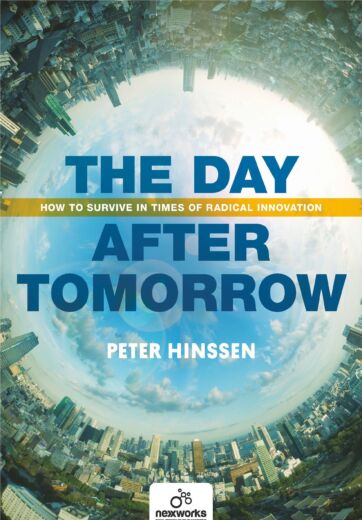Major platform companies like Alibaba or Airbnb are devouring the world as we speak, which is only a logical evolution from Marc Andreessen’s' prediction that ‘software is eating the world’. Contrary to traditional companies which focused on 'value chain' optimization, competitive advantage seems to no longer be the sum of all efficiencies for them, but rather the sum of all connections in the network, as Greg Satell put in Platforms Are Eating The World. The more connections, the more power. The more power, the more dominant in the market. In this age of networks we all stand to learn a lot from their approaches, especially those big corporate giants who seem to fail to enter the new network economy.

The Basic Ingredients Of Platform Disruption
People often ask me how the platform disruptors are able to gobble up markets at such an incredible speed? And what can we learn from them? I believe that these 4 common ingredients are their biggest strength: data, algorithms, networks and cold hard cash.
1. Data Driven
First of all, network economy disruptors like Uber are data hogs. They collect information at every step of the way. Imagine what Google-owned Waze knows about what happens on our streets every day. A lot more than our governments. Imagine what a company like Uber knows about our cities: what people do, where they need to go, how the flow of humans is evolving. Data truly is the ‘new oil’ for these network disruptors, and the discussions going forward about data governance, privacy and the regulatory aspects of this collection of data will be fierce.
2. Algorithm Prone
Data makes these disruptors in the network economy smart. Very smart. They build algorithms to navigate the data they collect and develop intelligence to mine the oil. The network disruptors 'understand' the evolution of supply and demand. Imagine a city, where Uber needs to 'understand' when cars will be needed, when concert halls will spill out spectators who need a ride home, when baseball games will end and where fans will need mobility, when movie theaters will generate demand for their services. Platform disrupters understand how to turn data into intelligence like no one else.
3. Network Sensitive
Disruptors love to play the network effects: they grow in value as their number of network nodes grow. That’s quite the opposite of the ‘scarcity’ value which states that an item's relative price increases based upon its relatively low supply. So networks and platforms have completely redefined the concept of value, and therefore of ownership. Playing the network effects is exactly what helps them scale and grow exponentially. That’s because of the positive feedback loop, where an ecosystem it gets stronger with every interaction. Tagging and liking makes connections and you 'infect' other users with your reactions. The network grows stronger with every single use. My favorite part of Uber is where you can send someone your 'ETA', and they can follow exactly where you are and when you'll get there. You can see the network connections spread like a virus. That’s how you grow exponentially.
4. Cash Flow Rich
About 20% of every Uber transaction in the world flows back to the mothership in San Francisco. Who would have thought that the taxi business would be so cash rich? That it could create such a stream of money for Uber? With the network effects, once you scale the network, and take a piece of the transactional value, these little cuts become massive cash flow streams. Jack Ma once beautifully quoted from his favorite Hollywood movie, Forrest Gump at the World Economic Forum: "Nobody makes money catching whales. People make money catching shrimps." Adding up a massive number of little things that are easy to sell, results in a really Big thing. A big load of dough.
The Network Disrupter’s Secret Sauce
But what is their magic? What’s the secret sauce that makes them grow at an exponential speed? Here again, I believe there are 4 essential factors that are shaping their success. Their guidebook would read something like this: a healthy disrespect for rules, removal of friction, a fantastic customer experience and a full leverage of the network.
1. Bypass Rules And Conventions
First of all, the network disruptors excel at bypassing rules and conventions. That’s because the existing market rules were created for the traditional businesses of the past. The regulators that developed the governance for the current markets developed their ideas in the 20th century, and the network players operate in the 21st century. That's why many platform businesses are illegal when they start. Uber is illegal in many countries, but gradually it is convincing — or should I say forcing — city by city to legalize it.
2. Remove Friction
Network disruptors also try to remove every single service friction. They excel at 'customers first, without compromise' and want to make their customers’ experiences as smooth as possible. The killer argument where Uber won over the hearts of their customers, was to remove the number one source of friction for taking a taxi: paying. Not that people don't want to pay. It's more the horror of paying in taxis all around the world. In many countries you can't use a credit card, or the machine to take your card is not working. In Switzerland, one of the most developed countries in the world, very few taxis accept credit cards. Instead, they will drive you to an ATM so you can get Swiss francs out of the wall. Uber removed that friction completely. You step out of the car, while paying automatically. Frictionless.
3. Pimp The Customer Experience
Network Disruptors aim to pimp the customer experience to unparalleled heights. Take the Uber example again when finding a ride is reduced to swiping your finger on a piece of glass. I heard a colleague recently talk about a city where Uber did not operate and where he felt the 'adrenaline' again of trying to hail down a cab in the middle of the street. Network disruptors replace this anxiety with flawless customer experiences.
4. Leverage The Network
Last but not least, this type of disruptors obviously also leverage the network, and allow people to build on top of their network. Often, they will open up their infrastructure, and allow others to connect, and build new businesses. Network disruptors know that if they open up their APIs (Application Programming Interfaces), more users will find their way to the network, more traffic will flow on their platform, and more value will be created on the ecosystem. Again, it’s all about the positive feedback loops.
The Uber platform has been used to allow other markets to take advantage of the new infrastructure. Look at ‘Uber Flu’ where — at the start of the flu season — you can ‘order’ a nurse to give you a flu-shot. Or the rise of ‘Uber Eats’ where you can have meals delivered via the Uber platform.
The platforms keep rising in popularity. They stop being invisible — like the old platforms like were — and are business models in themselves. My advice: use their strengths to shape your own after tomorrow.
This article is adapted from my forthcoming book, The Day After Tomorrow. Out on June 22 2017.
